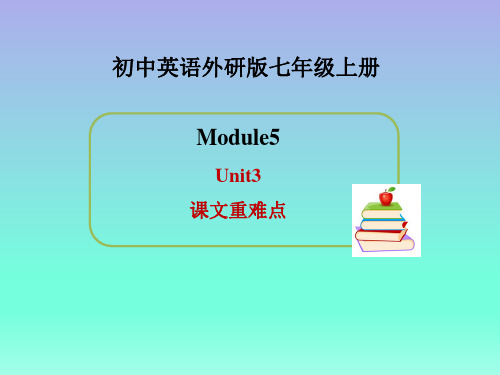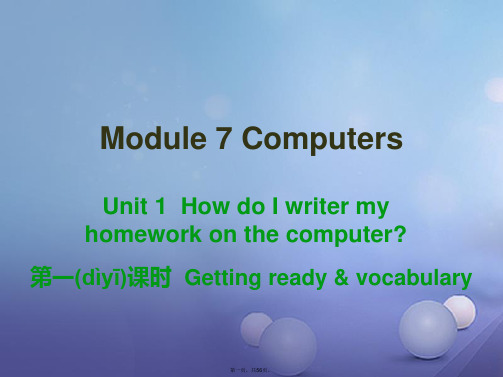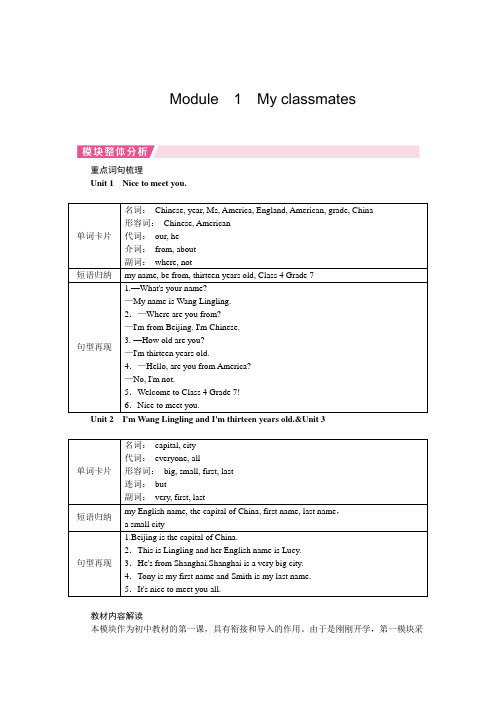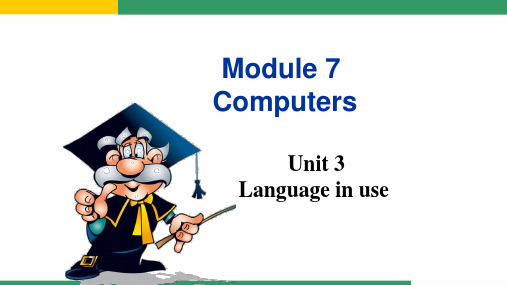七年级英语上册(外研版)素材 Module.7 Unit3新课落实
外研版七年级英语上册Unit3_课文重难点

用英语写出下列时间 6:00 _s_ix__o_’_cl_o_c_k_____ 5:30__fi_v_e_t_h_i_rt_y____/__h_a_lf_p_a_s_t_f_i_v_e____ 8:10 _e_ig_h__t _te_n______/__t_e_n__p_a_st__e_ig_h_t___ 7:20 _s_e_v_e_n_t_w_e_n_t_y__/_t_w__en__ty__p_a_s_t _s_ev_e_n_ 9:50 _n_i_n_e_f_if_t_y_____/__te_n__t_o_t_e_n_______ 10:40 _te_n__fo_r_t_y_____/_t_w_e_n_t_y__to__e_le_v_e_n__ 4:15 _f_o_u_r_f_if_t_e_e_n____/_a__q_u_a_r_te_r__p_a_st__fo_ur 3:45 __th_r_e_e_f_o_r_t_y_-f_i_v_e/_a__q_u_a_r_t_e_r_t_o_f_o_u_r
5:20——five twenty 2) 添加介词表示法:如果分数小于或等 于30,就用past来表示,结构是“分钟 +past+该点钟”;如果分钟大于30,就 用to来表示,结构是“分钟+to+下一点 钟”。
例如: 12:05—— five past twelve 9:50——ten to ten 8:40——twenty to nine
七年级英语上册Module7Computers课件(新版)外研版

Unit 1 How do I writer my homework on the computer?
第一(dìyī)课时 Getting ready & vocabulary
第一页,共56页。
课前导(qiándǎo)学
核心单词
keyboard
1. ________ n. 键盘
—OK, I will.
A. turn on
B. turn up
C. turn down
D. turn off
( )2. It is a bit hot, can you ________ the window?
C A. turn on
B. turn off
C. open
D. close
第十二页,共56页。
4. _______________ 保存(bǎocún)文件
save the document 典型句子
1. How do I write my homework on my computer? _我__如__何__在__电__脑__上__写__作___业__?___________________________
—I see.
A. Put; to
B. Ask; for
C. Connect; to
D. Switch; on
( )2. Can you connect the keyboard ________ the
compAuter. A. to
B. at
C. of
D. with
第五页,共56页。
【2】turn的用法 【教材例句】Finally, turn on the computer. 最后,打开电脑。 (教材第42页) 【要点思维导图】
七年级英语上册(外研版)素材 Module.1 模块整体分析

Module 1My classmates重点词句梳理Unit 1Nice to meet you.单词卡片名词:Chinese, year, Ms, America, England, American, grade, China 形容词:Chinese, American代词:our, he介词:from, about副词:where, not短语归纳my name, be from, thirteen years old, Class 4 Grade 7句型再现1.—What's your name?—My name is Wang Lingling. 2.—Where are you from?—I'm from Beijing. I'm Chinese. 3. —How old are you?—I'm thirteen years old. 4.—Hello, are you from America? —No, I'm not.5.Welcome to Class 4 Grade 7! 6.Nice to meet you.Unit 2I'm Wang Lingling and I'm thirteen years old.&Unit 3单词卡片名词:capital, city代词:everyone, all形容词:big, small, first, last 连词:but副词:very, first, last短语归纳my English name, the capital of China, first name, last name,a small city句型再现1.Beijing is the capital of China.2.This is Lingling and her English name is Lucy. 3.He's from Shanghai.Shanghai is a very big city. 4.Tony is my first name and Smith is my last name. 5.It's nice to meet you all.教材内容解读本模块作为初中教材的第一课,具有衔接和导入的作用。
Module 7 Unit 3(课件) 七年级英语上册(外研版)

3. I have breakfast at eight. When do you have breakfast?
4. I want to make friends with you. Who do you want to make friends with?
Module 7 Computers
Unit 3 Language in use
Learning aims:
1.To summarize and consolidate present simple questions
2.To know something about computer
3.To have teamwork and make a poster of computer
1. Where do you save your homework? 2. When do you use a computer? 3. How many emails do you write every
week? 4. Who do you write to?
a) I write to my friends. b) I save my homework in a document. c) I use my computer after school. d) I write three or four emails.
Warming up
Discuss
How do you use the computers in daily life?
(1). play games on the computer (2). send emails to friends (3). download music and films (4). chat online (5). search for information (6). do shopping online ……
七年级英语上册 Module 3 Unit 3 My school教案

外研版七年级英语上册教学案Module 3 Unit 3 My school教案年级七年级学科英语第一备课审核第二备课课题Unit 3 My school课型复习章节 3 备课时间授课时间第周星期第节学习目标1、本模块单词2、本模块出现的表方位的介词短语的用法3、There be 句型的陈述句、疑问句、及其答重点There be 句型的陈述句、疑问句、及其答难点There be 句型的陈述句、疑问句、及其答教学准备多媒体完成下列单词及短语。
黑板计算机字典图书馆十五十九九十十八在……的前面在……的旁边在……的后面总结:There be 句型肯定式:_________________________________________________否定式:______________________________ _______ __________疑问式:______________________ __________________________答语:___________________________________________________按要求完成句子:1 There _______(be )a pen and two pencils in the pencil—box.2 There are some people in the park .(否定句)There _________ __________ ___________ in the park .3 There is a pencil on the desk . (改为一般疑问句)____ ________ _______ on the desk?Yes,4 There is a ruler in the bag . (改为复数)There _________ _____________in the bags .5 There _________ (be) some food on the desk五、Complete the conversation with “there is ,there are, there isn’t, there aren’t, is there or are there”A: This is my school .It’s really big .(1)_________32classro oms in the building in front of you.B: (2)__________any science labs?A: No,(3)________any science labs in the building.(4)__________only classrooms and offices in this building . But (5) _________three science labs in the building behind it .B: (6)_________a television in your classroom?A: No,(7) ________.But (8 )________ a television in the library. (Check the answers together)六、Work in pairs ,Talk about your schoolThere is a librar y in our school .It’s ……七、Ask and answer about your school with your partner .----Where is the gym?----It’s.......八、Complete the sentences,Use “behind,infront of,or next to”课堂后测4、These are (we) pencils.5、Are the classrooms behind the gym?Yes , (their) are.6、 (his) can play the piano?学习反思。
外研版七年级英语上册_教材分析

外研版七年级英语上册_教材分析课程标准的总体要求培养学生的综合语言运用能力1语言技能2语言知识3情感态度4学习策略5文化意识①教材基本内容TalkingabouthealthyfoodM4DecribinganewHealthychoolfoodTalkingaboutDecribinganimalroutineTalkingaboutfamilymemberM3mychoolM6AtriptoM5MychooldaythezooDecribingaproceInvitinganddecribingbirthdaypartieM2MyfamilyM8ChooingpreentModule1ReviionAM1Myclamate.GivingperonalinformationModule6ReviionB外研版七年级英语上册M9PeopleandplaceDecribingwhatihappeningDecribingeventM10SpringFetival一、基本要求培养学生的综合语言运用能力听听懂熟悉话题的语段、简短的故事听说读写与教师或同学就熟悉的话题交换信息。
小故事及其他文体的简单书读面材料能参照范例或图片写出简写单的句子使用适当的学习方法,克服学习中的困难。
说学习策略情感态度文化意识英语学习表现出积极性和初步的信心能意识到语言交际中存在文化差异有关学校、家庭的介绍;健康食物、热爱动物;电脑的使用等。
二、编写意图新型的学习方式学习策略学会学习面向全体起点低由浅入深,循序渐进功能法听说法促进学生全面发展新教法生活化贴近学生现实生活多功能创新精神丰富文化编写意图体验跨文化交往教材的编写体例知识技能阅读训练写作练习readingliteningpeaking主要教学活动writing主要教学活动读写Unit1LanguagepracticeAroundtheworld听说Unit2学习模块Unit3Moduletak复习模块课后练习活动编写体例三、教材的知识结构和逻辑关系以题材为纲的功能-结构-运用性任务体系运用性任务词汇、交际用语、语法题材结构着重培养学生运用英语的能力四、语言结构名M1M2M3M4M5M6M7M8M9M10现在进行时词汇代词法介动简单句句法并列句语言结构语法项目一般现在时交际用语五、知识考点情态动词现在进行时动词一般现在时简单句Have/hagotTherebe并列句And;but副词数词代词连词介词可数名词及其单复数不可数名词名词所有格词法名词句法语法项目考试大纲对本册提出的要求交际用语Whatdayiittoday Let’…Whatabout…Wouldyouliketo…That’agreatidea.词汇。
外研版英语七年级下册Module7_Unit 3 第5课时单元教案与反思

Unit3第5课时人非圣贤,孰能无过?过而能改,善莫大焉。
《左传》原创不容易,【关注】店铺,不迷路!自主学习方案学生自学教材(P44~45)找出课文中的重点词组和句子。
完成教材(P46~47)的练习题。
课堂导学方案Step1情景导入教师要求学生熟读下面的语言训练。
(1)IwasborninQuincy.(2)ne.(3)Iwasn’tboredinQuincy.(4)—Wereyoudifficultinclasstoo?—No,Iwasn’t.(5)W’sw eekend?—Itwasn’t(benot)bad.(2)—Werettwo.环节说明:完成任务3和小结训练是巩固本节be动词一般过去时态的用法。
Step4完成教材4的任务1.用方框里单词和词组的适当形式填空。
2.小结训练。
(1)Teverymucfortable(comfort)ay1st1998或1stMay,1998。
2.ato→tomatoespotato→potatoes以o结尾的表示无生命事物的单词如photo,radio,piano等变复数时直接在末尾加“s”。
Step7家庭作业请完成模块7Unit3的练习题。
这一课时主要是教会学生用be动词的一般过去时态来谈论自己或者他人过去的生活等。
为了避免单调枯燥的课堂教学,提高学生学习的效果,在教学中教师可以引导学生将所学的语言运用到实际中。
如让学生们谈谈过去的生活。
“任务型”教学模式的运用,使学生有了明确的任务目标,他们主动参与课堂实践。
这样学生对于过去时态理解加深了,运用起来也更加得心应手了。
【素材积累】每个人对未来都有所希望和计划,立志是成功的起点,有了壮志和不懈的努力,就能向成功迈进。
1、立志多在少年,但宋朝文学家苏洵27岁开始发愤,立志就读,昼夜不息,结果大器晚成,终于成为唐宋八大家之一。
2、我国明代画家王冕,少年放牛时,立志要把荷花佳景惟妙惟肖地画出来。
他不分昼夜地绘画,立志不移,后来成为当时著名的画家。
外研版七年级英语上册《Module3MyschoolUnit3》说课稿

外研版七年级英语上册《Module 3 My school Unit 3》说课稿一. 教材分析外研版七年级英语上册《Module 3 My school Unit 3》的主要内容是介绍学校的一些场所和设施,如教室、图书馆、实验室、食堂等。
通过本节课的学习,学生能够掌握有关学校场所和设施的词汇,能够用英语简单介绍自己学校的设施和特点。
二. 学情分析七年级的学生已经掌握了基本的英语语法和词汇,具备一定的听说读写能力。
但部分学生对学校的场所和设施可能还不太熟悉,因此需要在课堂上引导学生进行观察和思考,帮助他们更好地理解和掌握相关词汇。
三. 说教学目标1.知识目标:学生能够掌握有关学校场所和设施的词汇,如classroom,library, laboratory, canteen等;能够用英语简单介绍自己学校的设施和特点。
2.能力目标:学生能够通过观察和思考,运用所学词汇进行口头和书面表达。
3.情感目标:培养学生对学校的热爱和自豪感,增强他们的集体荣誉感。
四. 说教学重难点1.重点:学生能够掌握有关学校场所和设施的词汇,能够用英语简单介绍自己学校的设施和特点。
2.难点:学生能够运用所学词汇进行口头和书面表达,特别是对学校的不熟悉的部分。
五. 说教学方法与手段1.交际法:通过小组讨论、角色扮演等形式,让学生在实际语境中运用所学词汇,提高他们的口语表达能力。
2.任务型教学法:通过完成各种任务,如观察学校场所和设施,让学生在实践中学习和运用词汇。
3.多媒体教学:利用图片、视频等教学资源,帮助学生更直观地理解和记忆词汇。
六. 说教学过程1.导入:教师通过提问方式引导学生谈论自己学校的设施和特点,激发学生的学习兴趣。
2.新课呈现:教师展示学校场所和设施的图片,引导学生说出相应的词汇,并板书重点词汇。
3.操练环节:学生分组进行角色扮演,模拟在各种学校场所和设施中的情景,如在图书馆借书、在实验室做实验等。
4.任务型活动:学生分组观察学校的场所和设施,用英语记录下自己的观察结果,并互相交流。
- 1、下载文档前请自行甄别文档内容的完整性,平台不提供额外的编辑、内容补充、找答案等附加服务。
- 2、"仅部分预览"的文档,不可在线预览部分如存在完整性等问题,可反馈申请退款(可完整预览的文档不适用该条件!)。
- 3、如文档侵犯您的权益,请联系客服反馈,我们会尽快为您处理(人工客服工作时间:9:00-18:30)。
Module 7Computers Unit 3Language in use短语互译1.与……分享…… __share…w ith…__2.玩电脑游戏__play_computer_games__3.公司的一位经理__a_manager_of_a_company__4.上网__go_on_the_Internet__5.购票__buy_tickets__6.listen to music __听音乐__7.make travel plans __制定旅游计划__8.watch movies __看电影__9.search for information __查找信息__10.send email to…__给……发电子邮件__句型在线1.你什么时候使用电脑?__When__ do you __use__ a computer?2.谁和他的爸爸共用一台电脑?Who __shares__ a computer __w ith__ his father?3.我家没有电脑。
There is __no__ __computer__ in my home.4.我给朋友发送电子邮件,还玩电脑游戏。
I __send__ email __to__ my friends and play computer games.●1plan n. 计划v. 计划;打算[观察] He also goes on the Internet to check the times of trains, make travel plans, and buy tickets.他也上网查看火车时刻、制定旅游计划并买票。
They plan to learn Chinese.他们计划学习汉语。
[探究] plan to do sth.表示“计划做某事”。
活学活用(1)Who makes travel __plans__ (plan) on the computer?(2)We plan __to_go__ (go) to Beijing.●2ticket n. 票[观察] Here is a cinema ticket.这儿有一张电影票。
[探究] ticket是可数名词,一般用名词作它的定语,且名词放在ticket 的前面,表示“……的票”。
[拓展] ticket后可接介词to或for,表示“……的票”。
例如:a ticket to/for the concert 一张音乐会的票活学活用英汉互译(1)a theatre ticket__一张戏票__(2)an air ticket__一张飞机票__(3)一张球赛票__a_ball_game_ticket__●3night n. 夜晚[观察] I listen to music or watch movies on the computer every Friday night.每周五晚上我在电脑上听音乐或看电影。
The light of his office is on at night.他办公室的灯晚上还亮着。
[探究] night常指夜晚人们睡觉前的时刻。
[辨析] night与eveningnight 一般指深夜、入睡的时刻。
睡觉前常说“Good night.”(晚安)。
at night指“在夜里”。
evening 一般指从日落到夜晚就寝之前这一段时间,人们还在活动、交际。
晚上与朋友见面,可以说“Good evening.”(晚上好)。
in the evening泛指“在晚上”,与in the morning类似。
活学活用(1)晚上我不喜欢出去玩。
I don't like to go out to play __in__ __the__ __e v ening__.(2)他晚上经常上网。
He often goes on the Internet __at__ __night__.●4information n. 信息[观察] On the Internet, I search for information, do my homework and check my email.在网上,我搜索信息、做作业和查看邮件。
[探究] information是不可数名词,不能直接与a/an连用。
若要表达“一条信息”,用a piece of information;表达“多条信息”要用复数pieces。
[拓展] information后面常接介词on或about,表示“关于……的信息”。
例如:I got some information about him.我得到了一些关于他的信息。
[辨析] information与newsinformation 常指通过观察、学习、阅读或上网得到的信息,强调“内容”。
What information is on the map?地图上有什么信息?news 为不可数名词,一般指报纸、电视等媒体向社会报道的最新消息。
Do you often listen to the 7 o'clock news in the evening?你经常听晚间七点的新闻报道吗?活学活用(1)孝感中考I think computers are very useful. They can help us get much ________ on the Internet.A.game B. informationC. ideaD. message[答案] B(2)The teachers often get ________ for our lessons ________ the Internet.A.information; for B.information; onC.news; to D.ideas; for[答案] B●5sometimes ad v. 有时候;不时[观察] But sometimes I play a lot of computer games and my mother doesn't like it.但是有时我玩太多电脑游戏,我妈妈不喜欢。
They sometimes go to school on foot.他们有时候步行上学。
[探究] sometimes是一个频度副词,表示偶尔发生,在句中位于be动词之后,实义动词之前,常用于一般现在时,与always (总是), usually (通常), often (经常), seldom (很少), never (从不)用法相同。
[辨析] sometimes, sometime, some time与some timessometimes副词,意为“有时”。
Sometimes she goes to work by car. 有时她开车上班。
sometime副词,意为“在某个时候”,可用于一般过去时与将来时。
You can hand in your homework sometime before Friday. 你可以在周五之前的某个时候交作业。
some time 名词短语,意为“一段时间”,time是不可数名词。
She will be away for some time.她将离开一段时间。
some times 名词短语,意为“几次”,time是可数名词,意为“次”。
I have seen the movie some times. 我看过这部电影几次了。
活学活用(1)温州中考—How often do you go skating?—________. I can't skate at all.A.Always B. SometimesC. SeldomD. Never[解析] D根据答语可知“因为不会,所以从来不滑冰”。
never意为“从不”。
(2) They'll meet again ________ next month.A.sometimes B. some timeC. sometimeD. some times[答案] C●6visit v. 探望;参观[观察] And do you want to v isit friends or family?你想拜访朋友或家人吗?[探究] visit作动词,意为“拜访;探望”,后面直接跟地点或人。
[拓展] (1)visit还可作名词,意为“参观”,常用搭配为be on a visit to…,意为“在……旅游”。
例如:Lingling is on a visit to Hong Kong.玲玲在香港旅游。
(2)visitor 为名词,意为“参观者”。
例如:Thousands of visitors come to Beijing Zoo at the weekend.周末成千上万的游客来北京动物园。
活学活用(1)The teacher with his students often ________ the old man.A.visits to B.visitsC.to visit D.visiting[答案] B(2)I'm thinking about a visit ________ Paris.A.to B.on C.at D.in[答案] A●1Who shares a computer with his father?谁和他的爸爸共用一台电脑?[探究] (1)who意为“谁”,用于询问主语,谓语动词用第三人称单数形式。
例如:Who does homework on the computer?谁在电脑上做作业?(2)share sth. with sb. 意为“和某人共同使用/分享某物”例如:I share the new bike with my son.我和我儿子共同使用那辆新自行车。
活学活用在我生日时,我和朋友们共同分享一个大蛋糕。
On my birthday, I __share__ a big cake __w ith__ my friends.●2There is no computer in my home.我家没有电脑。
[探究] 句中no 是形容词,意为“没有”,“no+名词”相当于“not a/an+可数名词单数”或“not any+可数名词复数/不可数名词”。
例如:There is no book on the desk.=There is not a book on the desk.课桌上没有书。
He has no children.=He doesn't have any children.他没有孩子。
There is no water in the bottle.=There isn't any water in the bottle.瓶子里没有水。
